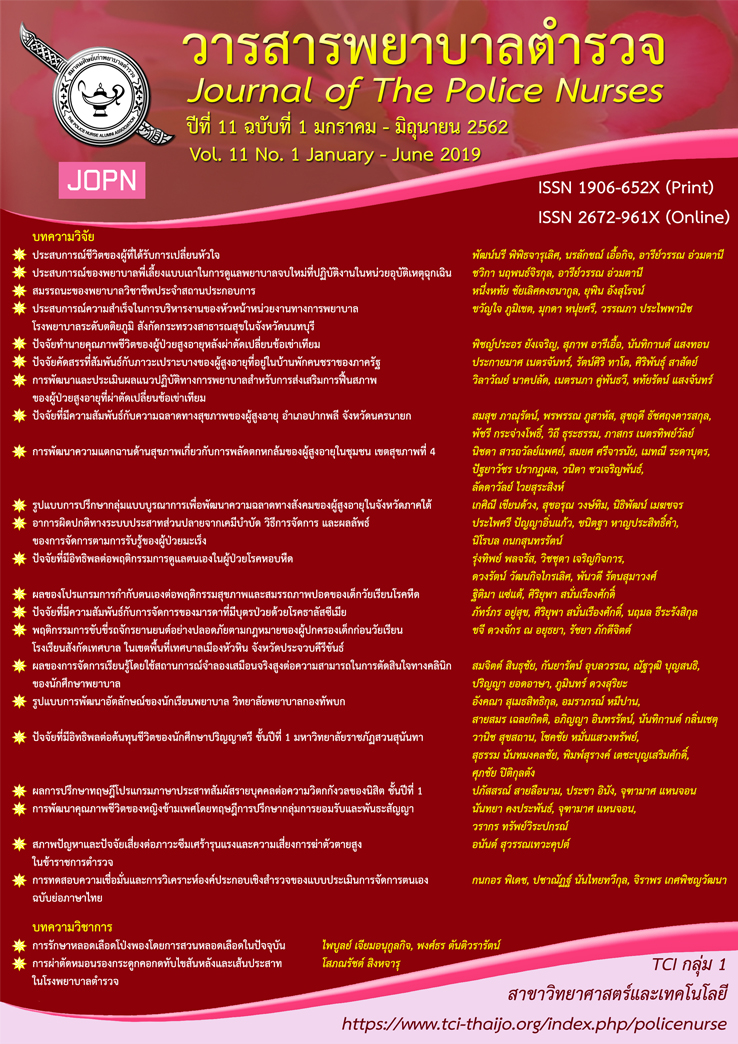EFFECTS OF THE SELF-REGULATION PROGRAM ON HEALTH BEHAVIORS AND PULMONARY FUNCTION OF SCHOOL-AGE CHILDREN WITH ASTHMA
Keywords:
school-age children with asthma, self-regulation program, health behaviors, pulmonary functionAbstract
The purpose of the quasi-experimental research aimed to investigate the effects of self-regulation program on health behaviors and pulmonary function of school-age children with asthma. The conceptual framework for this study was based on self-regulation’s concept (Bandura, 1986). The sample comprised of 50 school-age with asthma between 9 to 12 years old who visited the asthma clinic, pediatric outpatient department of the hospital, Pranakornsriayutthaya province. The samples were randomly assigned into control and experimental groups which were 25 equally. The control group received regular nursing care while the experimental group received the self-regulation program. Research instruments were self-regulation program, self-regulation of school-age children handbook and questionnaires. All instruments have been tested for content validity index (CVI) was .86. The Cronbach’s alpha coefficient of the questionnaire was .81. The data were analyzed by frequency, percentage, mean, standard deviation, chi-square test, and t-test. Setting the level of significance at .05.
The research finding as follows: The mean score of health behaviors and pulmonary function of the school-age children with asthma who participated in the self-regulation program were significantly higher than prior to the experiment at the level of .05 (t = 32.03, p = .000 and t = 22.85, p = .000). Moreover, the mean score of health behaviors and pulmonary function of experimental group after receiving the self-regulation program were significantly higher than those of the control group at the level of .05 (t = -9.891, p = .000 และ t = -8.13, p = .000).
In conclusion, this self-regulation program could be used to promote health behaviors and pulmonary function in the school-age children with asthma and have a problem of health behavior.
Downloads
References
Bandura, A. J. (1986). Social foundation of thought and action: A social cognitive theory. New Jersy, NJ: Prentice Hall.
Butz, A. M., Syron, L., Johnson, B., Spaulding, J., Walker, M., & Bollinger, M. E. (2005). Home‐based asthma self‐management education for inner city children. Public Health Nursing, 22(3), 189-199. doi:10.1111/j.0737-1209.2005.220302.x
Garbutt, J. M., Banister, C., Highstein, G., Sterkel, R., Epstein, J., & Burns, J. (2010). Telephone coaching for parents of children with asthma: Impact and lessons learned. Archives Pediatrics Adolescent Medicine, 164(1), 625-630.
Global Initiative for Asthma (GINA). (2015). Global strategy for asthma management and prevention. USA: Medical Communication Resources, Inc.
Manuyakorn, W. (2009). Pediatrics for medical students volume 1. Bangkok: Tanapres.
Nootara, K. (2013). Effect of yoga on pulmonary function and asthmatic control in school-age children (Master of nursing program, pediatric nursing). Ramathibodi School of Nursing, Faculty of Medicine Ramathibodi Hospital, Mahidol university, Bangkok.
Pakanta, I. (2000). Problem of sleeping and method of solution. Journal of Nursing of Narasaun University, 1(2), 31-38.
Parker-Oliver, D. (2005). Asthma management: A role for social work. Health & Social Work, 30(2), 167-170.
Phattarasatjatum, P. (2003). The effect of using perceived self-efficacy promoting program emphasizing family participation on health promoting behaviors of school-aged children with asthma (A thesis of master of nursing science program). Faculty of Nursing, Chulalongkorn University, Pathumwan, Bangkok.
Piaget, J. (2001). Piaget’s theory: Handbook of child psychology (4th ed.). New York, NJ: Wiley.
Polit, D. F., & Beck, C. T. (2006). Nursing research principle and method (7th ed.). Philadelphia, PA: Lippincott.
Prabpal, N. (2009). Respiratory distress. Bangkok: Beyond enterprise.
Scott, L. K. (2010). School-age child. In C. L. Edelman & C. L. Mandle, Health promotion throughout the life span (pp. 507-544). Elsevier Health Sciences.
Thanawong, K. (2014). Effects of health education learning management on personal health care using self-regulation theory on health behaviors of elementary school students. Journal of Education, 9(2), 1-15.
The Asthma Foundation of Thailand. (2012). Thai asthma database. Bangkok: Pimdee Limited Partnership.
Tipsrinaun, S., Taboonpong, S., Taniwatananon, P., Viriyachaiyo, V. (2004). Factors related to health practices and metered dose inhaling techniques among patients with asthma. Songklanagarind Medical Journal, 22(4),237-247
Wanchainawin, K. (1999). The study of health behaviors in school-age children with different level of control disease (A thesis of master of nursing science program, pediatric nursing). Faculty of graduate studies, Mahidol university, Nakhon Pathom.
Downloads
Published
How to Cite
Issue
Section
License
ผลงานที่ได้ตีพิมพ์แล้วจะเป็นลิขสิทธิ์ของวารสารพยาบาลตำรวจ



